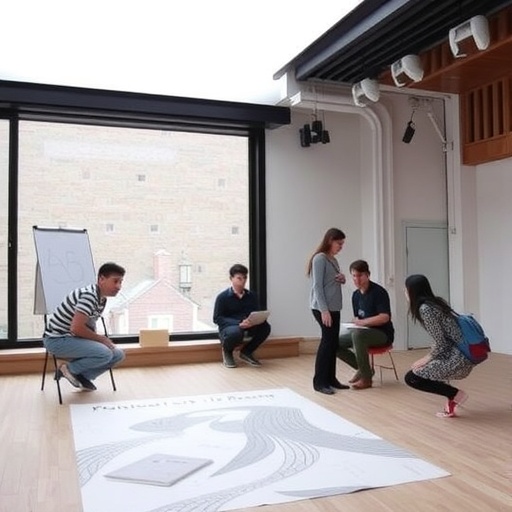In a world that has been irrevocably altered by crises, the concept of place-making has emerged as a critical area of study, particularly among populations that have historically encountered displacement and adversity. Recent research conducted by Nguyen-Trung, Vo, and Ly explores the dynamic interplay between spatial configurations and the socio-emotional landscapes of Vietnamese students studying abroad during tumultuous times. This thorough thematic analysis reveals how these young individuals navigate their environments, fostering a sense of belonging and community despite the challenges they face.
The study meticulously delves into the experiences of these students, highlighting their adaptability in response to various crises, whether economic, political, or social. By engaging in place-making activities, they not only carve out personal sanctuaries but also contribute to broader community resilience. This resilience is vital in the context of ongoing global uncertainties, offering a lens through which to view the agency that marginalized groups can exert in the midst of adversity.
Central to the findings is the notion that place-making transcends mere physical reconfigurations of space. Instead, it encompasses emotional, cultural, and social dimensions that allow individuals to redefine their identities in foreign lands. The research identifies specific strategies employed by Vietnamese students, including the establishment of communal spaces, cultural gatherings, and supportive networks that promote inclusion and solidarity. These elements collectively foster an environment where students feel empowered to express their heritage while simultaneously integrating into their host communities.
Moreover, the thematic analysis underscores the importance of language and communication in the place-making process. By utilizing their native language in conjunction with the local dialect, students can bridge cultural divides, enhancing their interaction with the local community and creating hybrid spaces that reflect their diverse identities. This linguistic dexterity not only aids in forging connections but also enriches the cultural tapestry of their host cities.
Another significant aspect of the research highlights the role of technology in facilitating place-making. With the rise of social media platforms, Vietnamese students are able to connect with peers both locally and globally, share their experiences, and mobilize support during challenging times. Digital spaces act as extensions of physical locations, providing a virtual haven where students can express concerns, celebrate achievements, and seek guidance. This interconnection of physical and virtual realms exemplifies the multifaceted nature of place-making in contemporary contexts.
Throughout the analysis, Nguyen-Trung, Vo, and Ly emphasize the evolving definitions of home and belonging among international students. For many, the traditional markers of home—such as family, culture, and nationality—begin to blur as they navigate new environments. This fluidity of identity contributes to a broader understanding of how communities can form in unfamiliar territories, challenge prevailing stereotypes, and foster inclusiveness.
One notable case presented in the research illustrates how students collaborated to establish a cultural festival showcasing Vietnamese traditions within their host city. This initiative not only allowed students to share their heritage but also invited participation from local residents, creating a vibrant dialogue between two cultures. The success of such events emphasizes the potential for grassroots movements to effect meaningful change and promote cultural exchange, transcending barriers that may otherwise isolate communities.
The thematic analysis also provides insight into the psychological benefits of place-making. As students engage in activities that reinforce their sense of identity and belonging, they report heightened emotional well-being and reduced feelings of isolation. This aspect of the study is particularly relevant in a post-pandemic world, where many individuals face mental health challenges exacerbated by social distancing and physical separation. The research validates the therapeutic potential of community involvement and cultural expression, suggesting that fostering such environments is crucial for the well-being of international students.
Moreover, the findings present implications for educational institutions, emphasizing the need for support systems that cultivate place-making efforts among students. Universities have a unique opportunity to facilitate these connections by providing resources, spaces, and programs that encourage cultural exchange and intercommunity collaboration. By proactively engaging with the international student population, institutions can enhance their educational environments, making them more inclusive and reflective of global diversity.
As the study draws to a close, it reflects on the ongoing implications of these findings within the context of global migration patterns. With an increasing number of individuals studying abroad, understanding the mechanics of place-making becomes essential for policymakers, educators, and community leaders alike. By fostering environments conducive to belonging and community resilience, stakeholders can collectively contribute to a more harmonious coexistence in increasingly multicultural societies.
In conclusion, Nguyen-Trung, Vo, and Ly’s research offers profound insights into the transformative power of place-making for Vietnamese students abroad. Their work not only contributes to academic discourse but also serves as a call to action for communities to embrace and support the varied experiences of international students. As the world continues to navigate crises, understanding how individuals reconfigure their environments will be vital in shaping inclusive futures that honor diversity and foster cohesion.
Subject of Research: Place-making among Vietnamese students abroad during times of crisis.
Article Title: Place-making in times of crisis: A thematic analysis of how Vietnamese students abroad reconfigure spaces.
Article References:
Nguyen-Trung, K., Vo, T.D., Ly, A.T. et al. Place-making in times of crisis: A thematic analysis of how Vietnamese students abroad reconfigure spaces.
High Educ (2025). https://doi.org/10.1007/s10734-025-01545-6
Image Credits: AI Generated
DOI: 10.1007/s10734-025-01545-6
Keywords: Place-making, Vietnamese students, international education, community resilience, cultural exchange, belonging, identity, migration.




